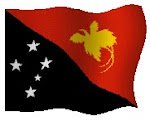PNG Women will be watching their MPs
cast their vote on 22 seats this session of Parliament.
(Monday, 15 November 2010).
Women around the country will be watching
closely this session of parliament for the passage of the bill to enact 22
reserved seats for women by elective process.
Elizabeth Palme Interim provincial
council of women’s President of Jiwaka said the focus will be particularly on
the Leader of Government Business and Minister for National Planning and
Monitoring Paul Tiensten to ensure the proposed Bill is put to a vote.
“Women throughout the country have
welcomed the commitment made by Prime Minister Grand Chief Sir Michael Somare
to push for the proposed Bill on 22 reserved seats for women during the coming
session.
“We know that the proposed Bill is now
on the notice paper of parliament business and our eyes are on Mr Tiensten to
ensure that the PM’s commitment is put to a vote,” Mrs Palme said.
“While the 2010 Supplementary and 2011
National Budgets will take priority we feel that empowering women in Papua New
Guinea is equally important as it is a vote in recognition of women who have
not been adequately represented on the floor of Parliament over the last 35
years.
“The Prime Minister has reaffirmed his
commitment towards women having a voice at the highest political level and we
are hoping our bill will get the nod this session.
“Law and order issues such as rape,
violence and underage sex will remain unaddressed if there is no representation
of women in the Parliament.
Women, who represent half of the
population of PNG are victims of such crimes like rape and violence. Such
issues will not be addressed adequately until there are enough women in the
National Parliament to call for a change,” Mrs Palme said.
The proposed model for women seats
will involve the creation of two-member provincial electorates. One will be a
female who occupies the reserved seat for women and the other member will be
the governor who occupies the existing Provincial seat.
The female member represents the
province but she is not the governor. Her constituency is the entire population
of the province and she sits in the national Parliament as well as the
provincial assembly and is eligible to be appointed as a minister or
chairperson of a parliamentary committee.












0 comments:
Post a Comment